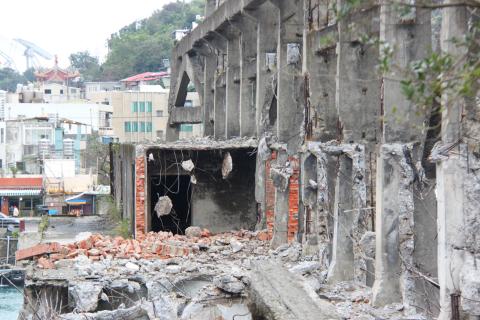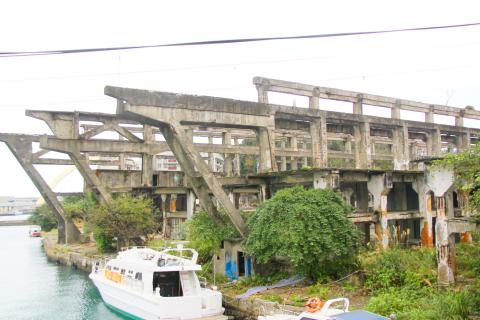A subcontractor that allegedly broke the law in the surprise partial demolition of the Agenna Shipyard in Keelung said that it planned to repurpose the area to enhance the city’s tourism beltway, with the demolition taking place to remove buildings that posed a threat to the public.
The shipyard was recently brought to public attention due to the 2014 filming of a trailer for Call of Duty Online, part of the first-person shooting game franchise Call of Duty, starring US actor Chris Evans, who is best known for his portrayal of the lead role in the Captain America movie franchise.
The subcontractor, which leased the land from Taiwan Sugar Co (Taisugar, 台糖) in 2008, allegedly violated Article 86 of the Building Act (建築法) when it moved two excavators to the site on Monday afternoon to remove the ruins.

Photo: Lin Hsin-han, Taipei Times
Article 86-3 stipulates that the unauthorized removal of buildings can result in a maximum fine of NT$10,000.
The subcontractor’s representative, Hsu Shu-ming (許書銘), said it had conducted inspections of the ruins and deemed them too old to be directly repurposed, adding that the demolition was aimed at making the area safer, especially following the magnitude 6.4 earthquake on Feb. 6.
The original plan was to keep the shipyard and open a theme restaurant nearby, but the ruins, while eligible for reinforcing, might have become rotten inside, which would have greatly increased overheads and posed a safety risk, Hsu said, adding that plans were later stalled when the city government was considering building a light-rail system nearby.

Photo: Lin Hsin-han, Taipei Times
Keelung Mayor Lin Yu-chang (林右昌) on Monday night on Facebook condemned the demolition and rejected the notion that the city government had knowledge of the subcontractor’s plans.
Anyone that shows so much disrespect for local buildings and their historical significance should be condemned, Lin said.
Lin said the city government would fine the subcontractor, as it did not apply for a permit to remove or demolish the building.
The city government has also demanded that the subcontractor cease all demolition work and apply for a permit, Lin said, adding that the city would do its utmost to preserve an “important remnant of Keelung’s early industry.”
Although the ruins are on private property, they are still an important part of the city’s history and should be conserved, Lin said, adding with regret that Monday’s abrupt demolition work might have marred the bright future repurposing could have given the shipyard.
However, the shipyard has not been named a historical heritage site and sits on land owned by Taisugar, which obtained it from now-defunct Taiwan Metals Mining Co (台金公司).
Meanwhile, Taisugar department of public relations director Liu Tsung-hsien (劉宗憲) said that the company had made clear to the subcontractor the parameters for development of the site.
There are no plans to develop the land around the shipyard’s ruins, Liu said, adding that Taisugar would release more information after clarifying details with the subcontractor.
The shipyard, next to Heping Bridge (和平橋), which connects Keelung and Heping Island (和平島), was originally owned and used by Japanese companies during the Japanese colonial era to expedite the transportation of gold from the Jinguashih (金瓜石) area in what is now New Taipei City. It derives its name from a US yacht manufacturing firm that had leased the property from Taiwan Metals Mining.

MAKING WAVES: China’s maritime militia could become a nontraditional threat in war, clogging up shipping lanes to prevent US or Japanese intervention, a report said About 1,900 Chinese ships flying flags of convenience and fishing vessels that participated in China’s military exercises around Taiwan last month and in January last year have been listed for monitoring, Coast Guard Administration (CGA) Deputy Director-General Hsieh Ching-chin (謝慶欽) said yesterday. Following amendments to the Commercial Port Act (商港法) and the Law of Ships (船舶法) last month, the CGA can designate possible berthing areas or deny ports of call for vessels suspected of loitering around areas where undersea cables can be accessed, Oceans Affairs Council Minister Kuan Bi-ling (管碧玲) said. The list of suspected ships, originally 300, had risen to about

DAREDEVIL: Honnold said it had always been a dream of his to climb Taipei 101, while a Netflix producer said the skyscraper was ‘a real icon of this country’ US climber Alex Honnold yesterday took on Taiwan’s tallest building, becoming the first person to scale Taipei 101 without a rope, harness or safety net. Hundreds of spectators gathered at the base of the 101-story skyscraper to watch Honnold, 40, embark on his daredevil feat, which was also broadcast live on Netflix. Dressed in a red T-shirt and yellow custom-made climbing shoes, Honnold swiftly moved up the southeast face of the glass and steel building. At one point, he stepped onto a platform midway up to wave down at fans and onlookers who were taking photos. People watching from inside

Japan’s strategic alliance with the US would collapse if Tokyo were to turn away from a conflict in Taiwan, Japanese Prime Minister Sanae Takaichi said yesterday, but distanced herself from previous comments that suggested a possible military response in such an event. Takaichi expressed her latest views on a nationally broadcast TV program late on Monday, where an opposition party leader criticized her for igniting tensions with China with the earlier remarks. Ties between Japan and China have sunk to the worst level in years after Takaichi said in November that a hypothetical Chinese attack on Taiwan could bring about a Japanese

The WHO ignored early COVID-19 warnings from Taiwan, US Deputy Secretary of Health and Human Services Jim O’Neill said on Friday, as part of justification for Washington withdrawing from the global health body. US Secretary of State Marco Rubio on Thursday said that the US was pulling out of the UN agency, as it failed to fulfill its responsibilities during the COVID-19 pandemic. The WHO “ignored early COVID warnings from Taiwan in 2019 by pretending Taiwan did not exist, O’Neill wrote on X on Friday, Taiwan time. “It ignored rigorous science and promoted lockdowns.” The US will “continue international coordination on infectious